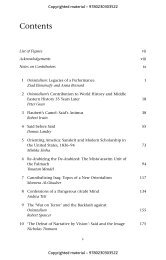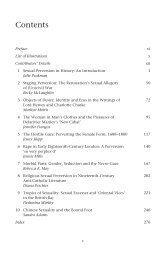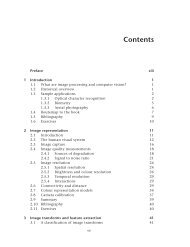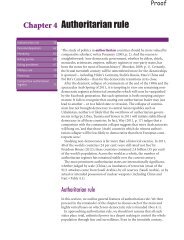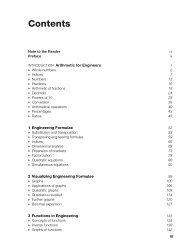The Nameless Shamelessness of Ulysses - Palgrave
The Nameless Shamelessness of Ulysses - Palgrave
The Nameless Shamelessness of Ulysses - Palgrave
You also want an ePaper? Increase the reach of your titles
YUMPU automatically turns print PDFs into web optimized ePapers that Google loves.
<strong>The</strong> ‘nameless shamelessness’ <strong>of</strong> <strong>Ulysses</strong> 39<br />
additional steps. A research note Richard Ellmann did not incorporate into<br />
his biography describes a conversation with A.J. Leventhal who recalls that<br />
as late as 1921 Joyce had been explicitly concerned about the threat <strong>of</strong><br />
libel and asked if any Blooms still resided in Dublin. Leventhal assured him<br />
that they had departed, thus apparently reassuring Joyce that he could use<br />
the name <strong>of</strong> the most clearly fictional character in <strong>Ulysses</strong> without undue<br />
risk. 49 Had Bloom, in fact, had some sort <strong>of</strong> clear historical antecedent,<br />
the grounds for a libel case would have been quite strong, particularly<br />
since the text delves so deeply into his sexual habits and private thoughts.<br />
Both in changing the names <strong>of</strong> certain key players and even in his careful<br />
research into the text, therefore, Joyce took careful account <strong>of</strong> the laws<br />
<strong>of</strong> libel.<br />
<strong>The</strong>se initial precautions only emphasize the importance <strong>of</strong> defamation<br />
law to <strong>Ulysses</strong> and the novel’s critique <strong>of</strong> the legal constraints that shape<br />
and define aesthetic practice. In his own attempt to disrupt the intentional<br />
fallacy, William Empson argues that rather than developing techniques (such<br />
as David Hayman’s ‘Arranger’) for distancing the author from the text and<br />
thus affirming the supremacy <strong>of</strong> fiction, we should instead realize ‘that<br />
Joyce is always present in the book – rather oppressively so, like a judge<br />
in court’. 50 Empson’s metaphor is more literal than he perhaps realizes,<br />
however, because <strong>Ulysses</strong> puts its readers too in a strangely legalistic position,<br />
becoming precisely those jurors who, according to the tort <strong>of</strong> libel, are<br />
alone empowered to determine whether or not a particular character has<br />
a historical antecedent and whether or not he or she has been defamed. 51<br />
This begins, as I have already suggested, when the novel itself begins atop<br />
the Martello tower, but continues throughout the text in a myriad <strong>of</strong> ways.<br />
It emerges almost comically, for example, in the conundrum <strong>of</strong> the famous<br />
‘man in the mackintosh’, an unnamed character who flits mysteriously in<br />
and out <strong>of</strong> the text. Scholars have struggled for decades to arrive at possible<br />
identifications for this character, a quest stymied by a stubborn anonymity<br />
that at once embodies and satirizes our search for the historical facts behind<br />
this fiction. In his study <strong>of</strong> gamesmanship in <strong>Ulysses</strong>, Sebastian Knowles<br />
argues that the book ‘is built on the equals sign’, a figure that describes not<br />
only the parallel paths taken by Bloom and Stephen but our own attempt to<br />
locate equivalences for the characters themselves. 52 Bloom himself thematizes<br />
our search for the history behind the fiction when, after masturbating<br />
on the beach, he strolls to the edge <strong>of</strong> the tide and uses a stick to write in<br />
the sand ‘I AM. A’ (U 13.1258, 1264). <strong>The</strong> sentence remains incomplete<br />
and any number <strong>of</strong> studies have attempted to infer the conclusion <strong>of</strong> this<br />
elliptical phrase. Joyce, however, deliberately provokes our inability to know<br />
who Bloom actually is – a mystery he quite legalistically preserved as his<br />
conversation with Leventhal indicates. Such uncertainty spirals nearly into<br />
madness in the ‘Circe’ episode, where names and identities shift so rapidly<br />
and so fantastically that identification becomes a kind <strong>of</strong> game or puzzle



